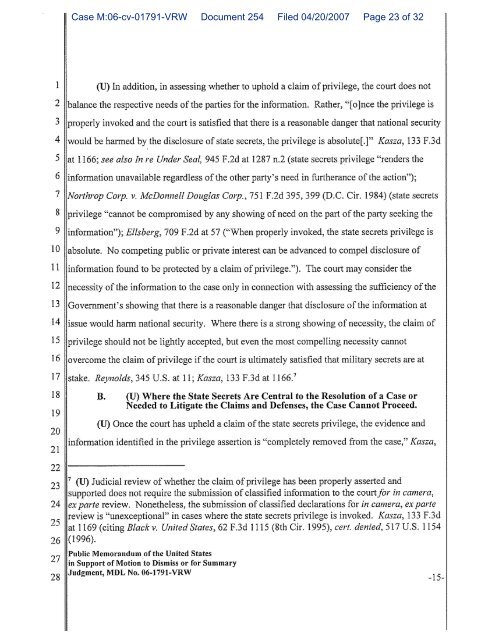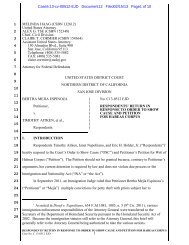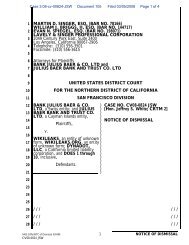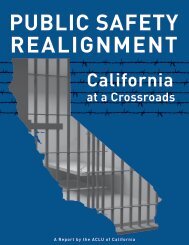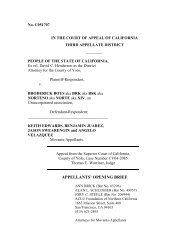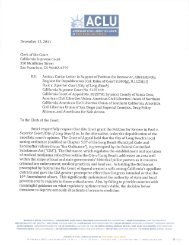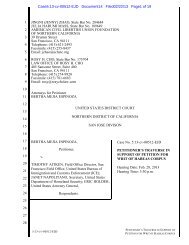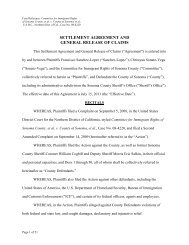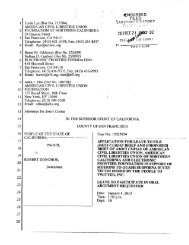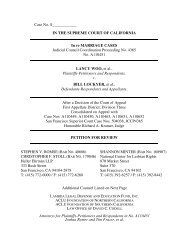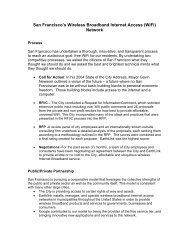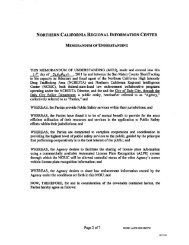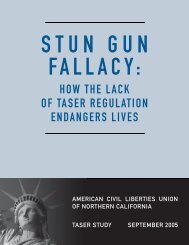1 of 2 - ACLU of Northern California
1 of 2 - ACLU of Northern California
1 of 2 - ACLU of Northern California
You also want an ePaper? Increase the reach of your titles
YUMPU automatically turns print PDFs into web optimized ePapers that Google loves.
Case M:06-cv-01791-VRW Document 254 Filed 04/20/2007 Page 23 <strong>of</strong> 32123456789101112131415t6171819202122232425262728(U) In addition, in assessing whether to uphold a claim <strong>of</strong> privilege, the court does notbalance the respective needs <strong>of</strong> the parties for the information. Rather, "[o]nce the privilege isproperly invoked and the court is satisfied that there is a reasonable danger that national securitywould be harmed by the disclosure <strong>of</strong> state secrets, the privilege is absolute[.]" Kasza, 133 F.3dat 1166; see also In re Under Seal, 945 F.2d at 1287 n.2 (state secrets privilege "renders theinformation unavailable regardless <strong>of</strong> the other party’s need in furtherance <strong>of</strong> the action");Northrop Corp. v. McDonnell Douglas Corp., 751 F.2d 395,399 (D.C. Cir. 1984) (state secretsprivilege "cannot be compromised by any showing <strong>of</strong> need on the part <strong>of</strong> the party seeking theinformation"); Ellsberg, 709 F.2d at 57 ("When properly invoked, the state secrets privilege isabsolute. No competing public or private interest can be advanced to compel disclosure <strong>of</strong>information found to be protected by a claim <strong>of</strong> privilege."). The court may consider thenecessity <strong>of</strong> the information to the case only in connection with assessing the sufficiency <strong>of</strong> theGovernment’s showing that there is a reasonable danger that disclosure <strong>of</strong> the information atissue would harm national security. Where there is a strong showing <strong>of</strong> necessity, the claim <strong>of</strong>~rivilege should not be lightly accepted, but even the most compelling necessity cannot)vercome the claim <strong>of</strong> privilege if the court is ultimately satisfied that military secrets are atstake. Reynolds, 345 U.S. at 11; Kasza, 133 F.3d at 1166.7B. (U) Where the State Secrets Are Central to the Resolution <strong>of</strong> a Case orNeeded to Litigate the Claims and Defenses, the Case Cannot Proceed.(U) Once the court has upheld a claim <strong>of</strong> the state secrets privilege, the evidence andinformation identified in the privilege assertion is "completely removed from the case," Kasza,7 (U) Judicial review <strong>of</strong> whether the claim <strong>of</strong> privilege has been properly asserted andsupported does not require the submission <strong>of</strong> classified information to the court for in camera,exparte review. Nonetheless, the submission <strong>of</strong> classified declarations for in camera, expartereview is "unexceptional" in cases where the state secrets privilege is invoked. Kasza, 133 F.3dat 1169 (citing Black v. United States, 62 F.3d 1115 (8th Cir. 1995), cert. denied, 517 U.S. 1154(1996).Public Memorandum <strong>of</strong> the United Statesin Support <strong>of</strong> Motion to Dismiss or for SummaryJudgment, MDL No. 06-1791-VRW-15-


